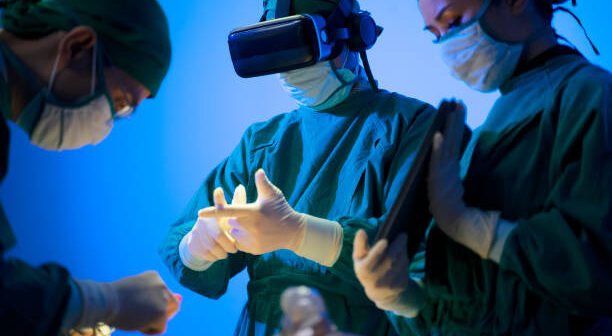The metaverse provides realistic healthcare settings and experiences, which can change how pharmaceutical companies and medical trainers engage with healthcare workers.
The rebranding of Facebook to Meta last year was one of the most significant changes in the industry in 2021.
Since then, it has dominated the news, and there is no indication of it slowing down. Unfortunately, however, there is a lot of misunderstanding regarding the metaverse.
Expressed refers to developing a network of virtual worlds centered on a new type of social connection. We can access these at any location on the earth and from any place on the planet.
Benefits of a Metaverse in healthcare
Some detractors challenge the metaverse’s long-term viability, as they are with any novel notion. Is the metaverse just a product of hype, or will it have the same impact on society as the internet did when it was first introduced?
While the focus has been on how it will affect brands and consumers so far, it also has the potential to alter the learning and training landscape drastically.
Interactive online ecosystems for specific training courses can be established with VR and AR, where users are actively needed to participate in activities and challenges, and participation can be measured. These metaverse experiences can be accessed from any location and provide virtual challenges and tests that users must complete to pass the course.
Healthcare communications are one area where the metaverse is starting to take off. Slide-based learning has no place in the metaverse for training. Instead, it offers users an immersive experience in a genuine healthcare facility where they can engage in cognitively stimulating activities.
How Metaverse will change the healthcare industry
Students can go on virtual home visits, interact with patients and caregivers in virtual reality scenarios, identify problems such as fall risks, and develop a management plan, for example.
This innovative approach to training, which includes the capacity to create avatars that can interact with others in a natural setting, is a modern way to keep employees engaged. In addition, learning from a virtual training session for healthcare workers allows learners to feel safe making mistakes without fear of repercussions.
This cannot be overlooked; it has numerous advantages, including cost-effectiveness, flexibility, and the encouragement of self-directed learning.
The onus will be on the communications industry (internal and external) to ensure that the benefits of the metaverse for learning and development – notably in highly scrutinized sectors like healthcare – are clearly articulated.
However, most individuals don’t own a VR headset or are comfortable installing apps to access the metaverse. Therefore, first-hand 3D immersive experiences are typically required for users to comprehend what it is and how it is used.
Users can instantaneously engage in an immersive experience through their browser on their mobile, laptop, or virtual reality headset, if they have one, by collaborating with web-based metaverse providers.
While some may find it challenging to comprehend, the metaverse undeniably holds new potential for the healthcare sector, combining nascent technologies such as artificial intelligence, virtual reality, the Internet of Medical Devices, and a variety of unique factors that will provide new directions for the industry.
As more healthcare organizations use metaverse comms and training sessions, it will be critical to ensure that this is recognized.
CTA; Read more blogs about metaverse on Nextmeet.live




